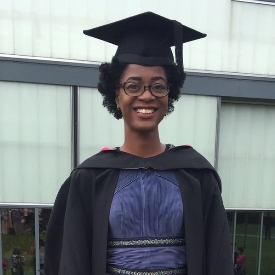
Tsitsi Ganga
Country Of Origin: United Kingdom
Degree: MSc Politics, Philosophy & Management, 2017
Why did you choose to study at LUMS?
I chose to study at LUMS because I had previously undertaken my Bachelors degree here. As part of this degree I completed a year in industry of which I enjoyed, but on reflection, I knew I was not yet ready to enter the world of work. I particularly enjoyed the modules that were offered by the Organisation, Work and Technology Department as an undergraduate student and that was what drew me towards the MSc PPM degree. I chose to continue my studies at Lancaster University because the PPR and OWT Department are ranked highly in their individual subject offerings. Furthermore, such a unique course that combined a lot of my interests was not available elsewhere.
What did you like most about your degree?
What I liked most about the degree was the freedom of choice in module selection. It was my first time studying politics, and although some of the concepts were new to me I thoroughly enjoyed the seminar and debate-based teaching methods used. This was an engaging form that really captured my attention as I was able to draw a holistic view of the world and of my modules through incorporating previous knowledge from my undergraduate degree. It made the connections that are predominant within political and business issues that I had previously not conceived.
What was your involvement in university life?
I attended a lot of events that were planned within the university, some pertained to career preparation. I also was involved with working with a few charities and this took the form of organising an event to raise money for these charities. I also had the chance to work with several societies in preparation for an event which centred on ‘Enterprise, Careers and Culture’. Additionally, I worked on a year-long project with the Richardson Institute Internship Programme (RIIP), a peace studies centre at Lancaster University. The project I worked on, ‘Refugees and Literacy Programme’, involved real-world research focused on a volunteer-led English language programme run in Doncaster. We were awarded ‘Project with the Most Impact’.
Did you do a company project/research within a company as part of your degree?
For my dissertation I had the opportunity to work with one of the largest NGOs in the UK. This took the form of conducting research interviews at their headquarters. This experience was very useful as I got to see first-hand inside their company and gained the chance to network at the same time. Conducting empirical research offered me useful insights for my dissertation that I would not have gained from secondary research alone, so working with them helped to strengthen my findings. The opportunity also afforded me the chance to refine my research methods, particularly my interview skills.
How would you summarise your experience at Lancaster?
My experience at Lancaster has been very rewarding, not only has it allowed me to grow academically, I have also grown personally as a result of the activities I got involved in, education I gained and the responsibilities that stemmed from them all. Equipped with my Masters in PPM I feel more qualified to seek new opportunities confidently, whether they be in academia or concerned with vocation. I had previously not considered undertaking a PhD but the PPM degree experience, specifically the amount of freedom we were afforded, provided me an opportunity to see that this is something I would be interested in in the future.
How the skills you gained during your time at Lancaster are helping you now?
Currently I am completing further study abroad at a top university in China for a term, this came about through a LUMS study abroad scheme. After completion of this I expect to commence a year of teaching English as a foreign language within China, hoping to improve upon my Chinese during this year. As I plan to work in an international organisation in future, I am taking this time as an opportunity to gain experience abroad. My interest in China rose from PPM modules I studied which centred on Globalisation and Democratisation, and another on Knowledge and Global Organisations.

